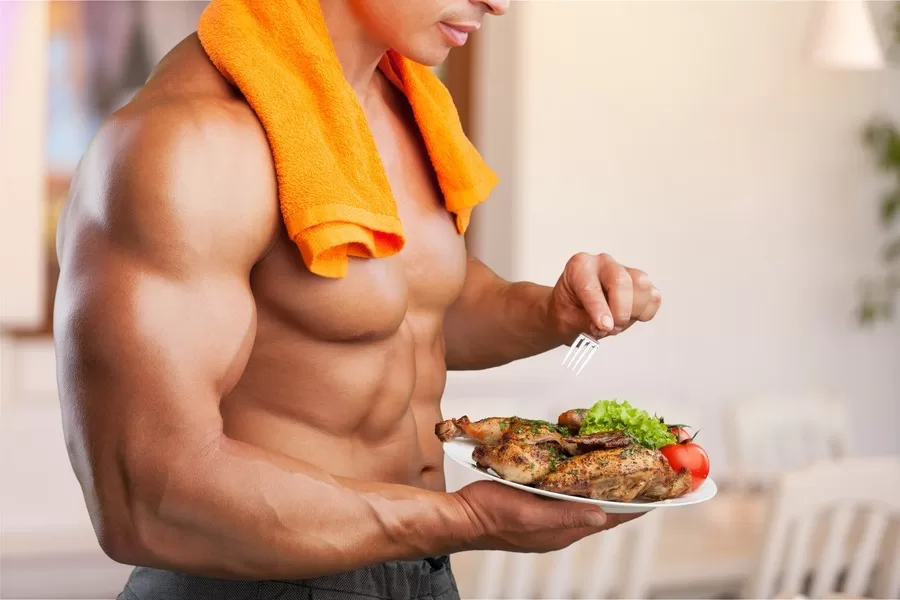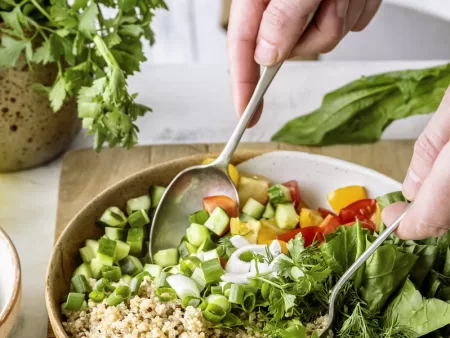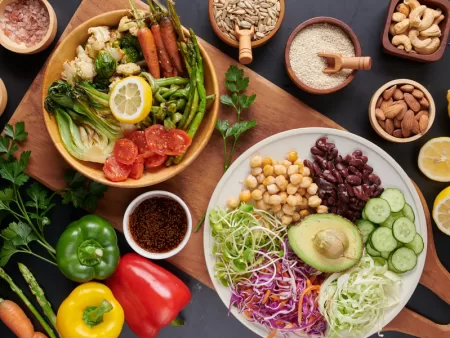
What is the secret to a toned figure? It’s a combination of the right foods at the right time. Muscle building foods will fuel your body and help you feel great and look even better! What is hidden under the word “proper nutrition”?
Healthy Foods for Muscle Growth:
Protein
It helps with recovery after workouts and builds strength. Quality protein for your muscles:
- Lean meats: Chicken, turkey, and lean beef cuts provide excellent protein with minimal fat.
- Seafood: Explore a variety like cod, shrimp, or scallops for high protein and essential nutrients.
- Eggs: Packed with protein and vitamins, they’re a quick, versatile option for any meal.
- Plant-based proteins: Explore tofu, edamame, or tempeh for a fiber-rich protein kick.
- Nuts and seeds: Almonds, chia seeds, and hemp seeds are small but mighty protein sources.
Adjust protein intake based on your activity level, aiming for 1.6-2.2 grams per kg of body weight for active lifestyles.
Carbohydrates
Carbohydrates are your body’s main energy source, especially for brain and muscles during exercise. What will provide you with long-lasting energy:
- Whole grains: Brown rice, quinoa, and whole-grain breads offer sustained energy and essential nutrients.
- Fruits: Apples, berries, and oranges provide natural sugars for quick energy and a wealth of vitamins.
- Vegetables: Spinach, carrots, and sweet potatoes are packed with vitamins, minerals, and antioxidants.
- Legumes: Beans and lentils offer both protein and complex carbohydrates for balanced energy.
Fats
Healthy fats are crucial for absorbing vitamins and supporting cell growth. Include the following fats in your diet:
- Monounsaturated fats: Avocados, olives, and peanuts provide heart-healthy fats that support overall health.
- Polyunsaturated fats: Found in fish, walnuts, and flaxseed, these fats include omega-3 and omega-6 fatty acids, essential for brain health and reducing inflammation.
- Saturated fats: While necessary in small amounts, aim to limit saturated fats typically found in butter and red meat, choosing leaner cuts and dairy options instead.
Understanding these nutritional building blocks can significantly enhance your health, energy levels, and physical performance. Consult with a nutritionist to tailor these guidelines to your personal needs for the best results.
Nutrition for Workout Enthusiasts
Embark on a culinary journey that aligns with your exercise regimen by considering the nutritional quality and timing of each meal. Prior to physical activity, your body seeks a balance of slow-releasing energy and muscle-supporting nutrients. Incorporate complex carbohydrates such as legumes or a slice of dense, grainy bread, coupled with a modest portion of grilled lean meats or a scoop of lentils for protein. Consider the inclusion of a small quantity of fats from sources like a sprinkle of chia seeds or a few slices of avocado for their nutrient-dense profiles and energy content.
In the window leading up to your workout, if your stomach signals for fuel, opt for a piece of fruit or a small serving of yogurt. These are quick to digest and can provide an immediate but gentle boost of energy. Throughout the workout, prioritize hydration with water or a custom-made drink that replenishes electrolytes, especially if the duration or intensity of the exercise is high.
Post-exercise, the body enters a recovery mode, making it crucial to supply it with proteins and carbohydrates promptly. A piece of baked salmon or a serving of quinoa can deliver the necessary protein, while a side of roasted vegetables or a medium-sized orange can offer restorative carbohydrates. This meal isn’t just about refueling; it’s about investing in your body’s recovery and future performance. Including a variety of colorful vegetables can supply an array of antioxidants, aiding in the reduction of exercise-induced stress on the body.
Adjusting these suggestions to fit the specific demands of your workout routine, personal energy needs, and digestive preferences is crucial. Your body’s response to different foods will guide you to the most effective meal plan for your exercise goals. Experimentation, coupled with attentive observation, will help refine your approach to nutrition, making each meal a stepping stone towards optimal fitness and health.
Meal Schedule and Quality
Athletes’ bodies are unique, and so are their nutritional needs. Proper meal portioning is critical for optimum performance, energy levels, and recovery. Here’s how athletes can tailor their meal portions:
Pre-Workout Nourishment
Athletes should look to consume about 1-4 grams of carbohydrates per kg of body weight before intense activities. This could be in the form of pasta, bread, or fruits. The inclusion of 15-30 grams of a lean protein source like chicken, tofu, or a protein shake can prepare muscles for the exertion ahead. A minimal amount of fats from sources like nuts or avocados can also be included to provide sustained energy.
During Exercise Snacking
In extended or high-intensity sessions, it might be necessary to refuel. Small, carbohydrate-rich snacks or drinks that provide 30-60 grams of carbohydrates per hour can help maintain performance levels. Options might include sports drinks, bananas, or small portions of energy bars.
Post-Exercise Recovery
After strenuous activity, athletes should aim to consume protein (20-40 grams) to aid muscle repair, alongside carbohydrates (1.1-1.5 grams per kg of body weight) to replenish energy stores. A recovery meal might be a lean meat or plant-based protein with whole grain rice and vegetables. This meal should be consumed within 30 minutes to an hour post-exercise for optimal absorption and recovery benefits.
Hydration Strategies
Hydration needs can vary based on the athlete’s size, the sport, and environmental conditions. However, a general rule is to drink at least 500-700 ml of fluid per hour of exercise, adjusting as necessary for conditions and sweat loss. Post-workout rehydration should replace any fluid lost, and include electrolytes if the exercise duration was prolonged or sweat loss was significant.
General Daily Eating
Outside specific workout-related meals, athletes should aim for a balanced diet throughout the day. This includes a variety of vegetables for micronutrients, sufficient proteins for muscle maintenance, and carbohydrates for ongoing energy needs. Portions should be adjusted based on daily activity levels, goals (whether building muscle, maintaining weight, or reducing fat), and overall energy expenditure.
Understanding and adjusting portion sizes according to individual needs, activities, and response to different foods is crucial for athletes. Continuous monitoring and possibly working with a nutrition expert can help fine-tune these aspects, ensuring the dietary approach supports both health and performance objectives.
Supplements for athletes
Every athlete’s journey is different, and so are their nutritional needs. Supplements can be like personal trainers for your body’s health, each with a unique role.
- Protein Powders: Think of them as the quick fix for hungry muscles needing repair after you’ve pushed them hard. They come in various flavors and types – whey for fast action or soy for a plant-friendly option.
- Creatine: Like a turbo boost for your muscles, creatine helps in short, explosive activities. Whether you’re lifting weights or sprinting, it gives your muscles an extra energy kick.
- Beta-Alanine: This one’s like the marathon runner of supplements, helping you go longer and harder by buffering the acid that builds up in muscles during intense activity.
- Omega-3s: These are the cool, calming agents, working to reduce inflammation and keep your heart healthy, so you’re ready for the next workout.
- Electrolytes: Imagine these as your body’s battery chargers, especially important when you’re sweating buckets. They keep your energy up and prevent muscle cramps.
- BCAAs: These are your muscle’s best friends, helping to repair and build muscle, especially after those grueling sessions.
- Vitamin D and Calcium: Essential for keeping your bones strong and healthy, especially if you’re often training indoors away from natural sunlight.
- Iron: For endurance lovers, iron is like the oxygen messenger, helping to transport it where it’s needed most during your long runs or rides.
- Antioxidants: They act like your body’s own defense system against workout wear and tear, helping to keep cells healthy and recover faster.
- Beetroot Juice: Not just a trendy health drink, beetroot juice is packed with nitrates that help increase blood flow and oxygen to muscles, boosting stamina and endurance.
Supplements can be a great addition to your training regimen, but they’re most effective when used in conjunction with a balanced diet and tailored to your specific athletic goals and needs. Always consult with a healthcare professional to ensure these boosters are right for you and fit well into your overall health and training plan.
Conclusion
Understanding and applying the principles of nutrition tailored to your personal needs and exercise regimen can significantly enhance your health, energy levels, and physical performance. Consulting with a nutritionist can provide personalized guidance to optimize your dietary strategy for the best results.
Tailor your diet to your workout regimen for optimal performance and recovery. Stay hydrated and consider supplements as part of a balanced diet. Know when to take each supplement. For example, gulp down that protein shake after you finish exercising to help repair your muscles. If you’re into something like creatine, taking it before you start exercising might give you a nice boost. These simple rules will help you in the process of building muscle mass and make it as simple, interesting and useful as possible.
FAQs
Ideally, within 30-60 minutes to aid recovery.
Typically 1.6-2.2g per kg of body weight, depending on activity.
Focus on unsaturated fats found in avocados, nuts, and fish.
Absolutely, supplements are just there to fill in the gaps. A good diet is always the foundation.
Yes! Things like Beta-Alanine can help keep your muscles going for longer.
Try to have it within 30 minutes after you finish up. That’s when it seems to do the most good.







